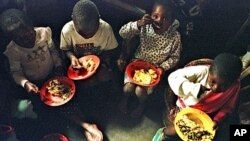During the 1994 genocide, about a million Rwandan children lost one or both parents. Dozens of orphanages were built to care for these vulnerable youngsters.
Now, in the next few years, the Rwandan government hopes to close the majority of the country’s children’s homes. Rwanda’s so-called "child deinstitutionalization" (DI) policy, which, despite initial concerns, is attracting global support.
Orphanages grew after genocide
Rwandan Prime Minister Pierre Habumuremyi observes that there were only a handful of orphanages in Rwanda prior to the genocide. Today, there are more than 30. "Orphans were not part of Rwandan culture. Children are the responsibility of the community - especially children who have lost a parent," he explained. "That was one of the tenets of Rwandan culture."
A growing body of research suggests orphanages are not always the places they were envisioned to be. Claudine Nyinawagaga is Rwanda country director with the British charity, Hope and Homes for Children.
"Children raised in institutions lack a very important element of love. Some are facing malnutrition; sexual abuse; there is not follow up to ensure the children are receiving an adequate education," Nyinawagaga said.
Led by the prime minister and assisted by Hope and Homes for Children, Rwanda is pursuing a national policy of child "deinstitutionalization", or D-I, under which Rwanda’s orphanages will gradually be closed.
Inside Rwanda's orphanages
Even institutions run by well-intentioned owners have their shortcomings compared to a good family home.
Until recently, Mpore Pefa orphanage in Kigali’s suburbs, sheltered more than 50 children. A rusty axe lies on the floor outside a dormitory where children sleep up to four per bed.
The walls in the dormitory are pockmarked. The bed is a foam mattress with an old sheet draped across it. The room smells of stale urine. It is absolutely filthy.
Deinstitutionaling children
In May, Mpore Pefa will be the first orphanage in Rwanda to close under the national D-I policy. With due care, youngsters will be placed in loving homes and looked after by specially trained foster families or, where possible, their own extended families. Annonciate Bamurange is Mpore’s director.
"The government showed me the advantages of children growing up in a family. Some orphanages won’t join the program. They see kids as a business," Bamurange stated.
Zaina Nyiramatama is executive secretary of the National Commission for Children. She explains that the D-I initiative will be grassroots-driven, part of a broader childcare policy where Rwandan communities again participate in identifying and solving the problems of their most vulnerable children.
"The head of the village, all the village council has to look at the issue ... and bring the village together to solve the issue, Nyiramatama explained. "What[ever] is too difficult for them, can then be reported higher."
When Rwanda’s D-I policy was announced last August, concern was expressed at what resources would fill the gap as institutions close.
Alternatives
Victoria Martin, Hope and Homes for Children’ senior Africa program manager, says more suitable alternatives will be provided.
For instance, emergency support and family counselling, as well as vocational training and micro-credit will be made available through so-called “community hubs”.
The needs of youngsters in long-term care, whose adjustment to community living might be particularly complicated, will be another priority.
"Independent living is also an option for young people who have spent a long time in institutions and are at an age to be living on their own," Martin said. "We will give them every support that we can."
16-year-old Moses has already benefitted from the D-I policy. He and his younger sisters were abandoned by their impoverished father six years ago.
Thanks to the pilot project, Hope and Homes for Children discovered their mother was still alive. She had been looking for her offspring since their disappearance.
The family was recently reunited. In their modest kitchen, Moses, his mother and sisters joyfully recount their feelings. "The best thing is being home with Mom. You are isolated in an institution. There is no one to love you. You eat, sleep, go to school," he said. "There is little else to life. Now, our identity has been restored and our lives have completely changed."
The United Nations sees Rwanda taking a global lead in deinstitutionalization. So convinced is Habumuremyi of the D-I policy’s significance, at Christmas he and his family adopted an 18-month-old boy. "He was abandoned, so we didn’t know his name. My older children, who studied in India, call him Tambi, which means ‘Little Brother’ in the Indian language. He is my son," Habumeremy stated.
As the 18th anniversary of the Rwandan genocide approaches, even the youngest babies placed in orphanages after the terrible events of 1994 are approaching adulthood.
Many here say this year seems an appropriate moment for Rwanda to revert to its traditional, community-based system of caring for its most vulnerable children.









